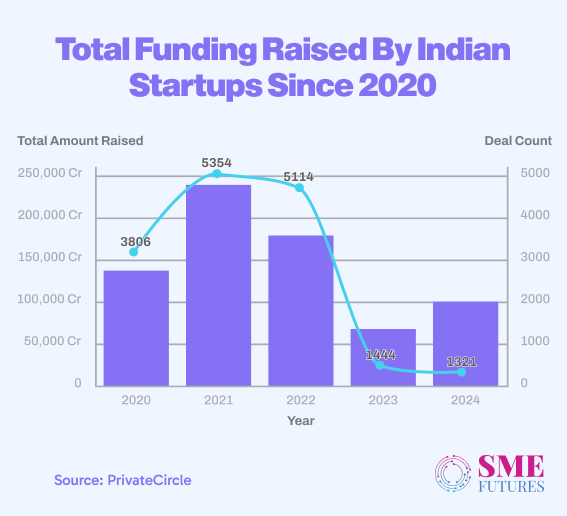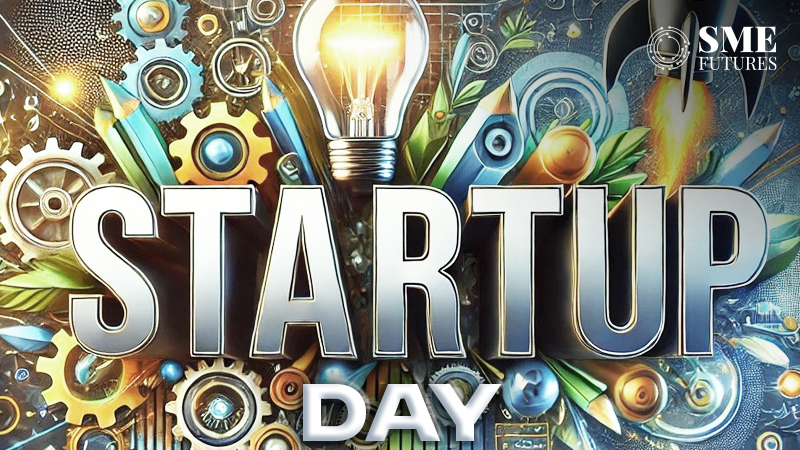National Startup Day 2025: Emerging technologies like AI, blockchain, and advanced productivity tools are transforming small businesses in India, offering new opportunities for innovation and growth. With government support and scalable tech integration, these advancements are driving sustainable, inclusive growth and reshaping the entrepreneurial landscape in 2025.
The Indian entrepreneurial landscape is undergoing a transformative shift, driven by the twin forces of innovation and resilience. National Startup Day serves as a powerful reminder of the pivotal role startups and MSMEs (Micro, Small, and Medium Enterprises) play in driving economic growth and technological advancement.

As we dive deeper into 2025, emerging technologies like AI, blockchain, and advanced productivity tools are redefining the way small businesses operate, innovate, and grow in an increasingly digital world. Industry leaders and experts share their insights into how these innovations are reshaping the ecosystem and unlocking unprecedented opportunities.

The power of problem-solving innovation
“Startups are not just about creating valuation for a company; they’re about developing solutions that truly address customer challenges, which requires patience, persistence, and experimentation,” said Ajay Goyal, Co-Founder & CEO of Erekrut.
Highlighting the journey of patience and persistence, he shares how Erekrut’s innovations like OneDayHire (ODH) and Talent Suite have transformed recruitment by delivering qualified leads within minutes and connecting organisations with highly matching candidates in days.
“After 15-18 months of rigorous effort and innovation, we introduced OneDayHire (ODH), delivering 50-100 qualified leads within 30 minutes, and Talent Suite, which connects organisations with 20-40 highly matching qualified candidates in just 5-8 days,” said Goyal.
These solutions exemplify how startups are solving complex industry problems with targeted innovation.
AI and Blockchain: Game-changers for growth
The transformative power of AI and blockchain cannot be overstated. Anirudh Varshney, Founder and CEO of Trailytics, explained, “AI enhances data-driven decision-making and customer engagement through chatbots, while blockchain ensures secure transactions, building trust in finance and supply chain sectors.” These technologies, coupled with SaaS platforms, are enabling small enterprises to gain a competitive edge globally.
“Data analytics is another game-changer, offering actionable insights that help startups identify trends, optimise strategies, and enhance customer experiences. By harnessing analytics, businesses can make informed decisions, further boosting efficiency and profitability,” said Varshney.
“By 2025, these technologies are set to revolutionise startup growth and productivity. AI will predict market trends, blockchain will enable faster cross-border payments, and productivity tools will drive seamless global collaboration,” pointed out Varshney.
These innovations will not only cut costs but also unlock new revenue streams, helping businesses scale faster and smarter.
Bridging physical and digital commerce
Companies are working around the clock to provide their customers with more and more ease: from working on the user-interface to make it more attractive and customer- friendly to wholly developing new things that bridges gaps in marketing and promotion. The competition is stronger than ever with multiple companies working across the same field to bring new innovations and products to sway away the market.
Ahmed Hussain, Innovation Officer at Pathfinder, stresses the importance of technology in creating a seamless “phygital” experience. “Our platform’s AI-driven architecture allows us to manage everything from personalised shopper recommendations to seamless retailer integrations,” he underlined.
The company’s innovations like RetailGPT and eReceipts have significantly enhanced customer engagement and operational efficiency, providing retailers with tools to compete in an increasingly digital-first market.
Hussain also highlights the adaptability of technology in diverse markets. “RetailGPT’s API-first approach and modular architecture enable us to tailor integrations to local requirements, ensuring a consistently high-quality experience for customers worldwide,” he shared.
Scalable and sustainable integration
For businesses aiming to adopt advanced technologies, accessibility and scalability are key. The more scalable your business is the more growth will the brand experience.
Anurag Gupta and Rajeev Tiwari, Co-Founders of STEMROBO, advocate for clear objectives aligned with a business’s vision.
“To effectively integrate advanced technologies while ensuring accessibility and scalability, businesses should begin with clear objectives aligned to their vision. They must prioritise accessibility by developing user-friendly, affordable, and cloud-based solutions compatible with various devices. Investing in scalable infrastructure, such as flexible cloud platforms and modular architectures, ensures seamless growth. Upskilling employees and fostering a culture of continuous learning is crucial for maximising technology adoption,” pointed out Tiwari.
“Technology plays a vital role in fostering sustainable growth by driving innovation, improving efficiency, and addressing regional and industry-specific challenges. It enables solutions such as renewable energy systems, smart grids, and resource-efficient manufacturing to reduce environmental impact. In agriculture, technologies like IoT and AI optimise water usage, crop yield, and supply chains. For regions with limited access to resources, digital tools provide education, telemedicine, and financial inclusion opportunities. Industry-specific challenges, such as workforce skill gaps, are addressed through virtual training platforms and automation,” said Tiwari.
Technology can not help in the growth of the company but is also necessary for employee engagement. This could be very well done by a balanced use of AI and manual workforce. Sourabh Deorah, CEO and Co-founder of AdvantageClub.ai, provides some good pointers on this aspect.
“Our decision to adopt AI has been the most impactful for our growth. But it’s not just about using AI—it’s about applying it effectively. We’re heavily investing in AI, which we believe will be transformative for our industry. Our first AI bot, Adva, is already live, and we plan to build on this foundation. AI will enable us to create smarter, more personalised, and impactful solutions for employees and organisations, setting a new standard in engagement and efficiency,” pointed out Deorah.
Deorah illustrates the transformative potential of AI in employee engagement. “Our platform’s AI-based nudges ensure that employees make the most of the benefits and budgets provided to them,” he contended. With a redemption rate of over 90 per cent and budget utilisation hitting 95 per cent, AdvantageClub.ai demonstrates how AI can optimise resources and enhance satisfaction.
Deorah’s emphasis on applied AI offers a lesson for startups: “Focus on solving real problems rather than implementing AI for novelty. When used to address genuine challenges, AI creates a multiplier effect in terms of impact and growth. But it’s also not just about using AI—it’s about applying it effectively. We’re heavily investing in AI, which we believe will be transformative for our industry.”
The role of government and policy

Government initiatives like Digital India and Start-up India have played a significant role in accelerating technology adoption among MSMEs. Anirudh Varshney points to the importance of favourable policies and infrastructure. “The government’s focus on creating tech hubs and providing financial incentives can significantly boost innovation,” he noted. Continued investment in such initiatives is essential to keep the momentum going.
Moreover, collaborations between the private and public sectors can address challenges such as limited access to capital and skill gaps. Anurag Gupta suggests creating platforms for knowledge sharing and mentorship to empower small businesses with the tools they need to succeed in a technology-driven world.
The road ahead
As we approach 2025, the convergence of AI, blockchain, and other emerging technologies promises to revolutionise startup growth and productivity in India. From transforming customer experiences to optimising operational efficiency, these innovations are setting new benchmarks for success. However, as Ahmed Hussain aptly points out, the key lies in building technology that scales alongside the business. “Start small, but invest in a strong, scalable foundation that can adapt to new market demands,” he advises.
SMEs and MSMEs are slowly understanding the pros of taking their business online. Speaking on the same lines, Nitesh Lobo, owner of Lobo Tailors, a custom tailoring shop in Lucknow, shares, “The time has truly come when SMEs and MSMEs need to prioritise taking their business online. It has become a major factor to reach your target audience and cater to a large audience. I’m sure in the coming days, SMEs and MSMEs will be striving to work both offline and online.”
On this National Startup Day, as we celebrate the strides made by Indian startups and MSMEs, it’s clear that the future of small businesses is intertwined with the innovative application of technology. By embracing these tools and strategies, Indian entrepreneurs are not only transforming their own ventures but also contributing to a more connected, efficient, and sustainable economy.
“Aligned with the ‘Startup India @ 2047 – Unfolding the Bharat Story’ theme, India’s vibrant startup ecosystem, driving 10-15 per cent of GDP growth, is crucial for achieving the $5 trillion economy goal. Startups are key to innovation, scaling, and addressing critical market needs, particularly by leveraging AI to overcome challenges like last-mile delivery and unlock significant growth opportunities for the nation, thus unfolding the ‘Bharat Story’ of inclusive and sustainable development,” pointed out Shashank Dubey, Co-founder and Chief Revenue Officer, Tredence.










